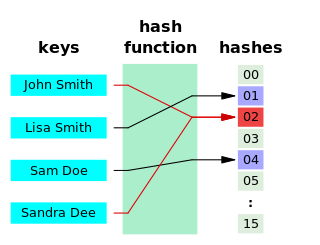
In classical music, a fugue is a contrapuntal, polyphonic compositional technique in two or more voices, built on a subject that is introduced at the beginning in imitation, which recurs frequently throughout the course of the composition. It is not to be confused with a fuguing tune, which is a style of song popularized by and mostly limited to early American music and West Gallery music. A fugue usually has three main sections: an exposition, a development, and a final entry that contains the return of the subject in the fugue's tonic key. Fugues can also have episodes, which are parts of the fugue where new material often based on the subject is heard; a stretto, when the fugue's subject overlaps itself in different voices, or a recapitulation. A popular compositional technique in the Baroque era, the fugue was fundamental in showing mastery of harmony and tonality as it presented counterpoint.

A hash function is any function that can be used to map data of arbitrary size to fixed-size values, though there are some hash functions that support variable-length output. The values returned by a hash function are called hash values, hash codes, hash digests, digests, or simply hashes. The values are usually used to index a fixed-size table called a hash table. Use of a hash function to index a hash table is called hashing or scatter-storage addressing.
Hash, hashes, hash mark, or hashing may refer to:

The Art of Fugue, or The Art of the Fugue, BWV 1080, is an incomplete musical work of unspecified instrumentation by Johann Sebastian Bach. Written in the last decade of his life, The Art of Fugue is the culmination of Bach's experimentation with monothematic instrumental works.
A sandstorm is a storm caused by strong wind and sand or dust.
A quark is an elementary particle.
A whirlpool is a swirling body of water.
A black cat is a cat with black fur.
Salt is a dietary mineral, used for flavoring and preservation.
Condition or conditions may refer to:

The Grosse Fuge, Op. 133, is a single-movement composition for string quartet by Ludwig van Beethoven. An immense double fugue, it was universally condemned by contemporary music critics. A reviewer writing for the Allgemeine musikalische Zeitung in 1826 described the fugue as "incomprehensible, like Chinese" and "a confusion of Babel". However, critical opinion of the work has risen steadily since the early 20th century and it is now considered among Beethoven's greatest achievements. Igor Stravinsky described it as "an absolutely contemporary piece of music that will be contemporary forever".
An image is an artifact that depicts visual perception, such as a photograph or other two-dimensional picture.
Blake or Blake's may refer to:
Fugue is a cryptographic hash function submitted by IBM to the NIST hash function competition. It was designed by Shai Halevi, William E. Hall, and Charanjit S. Jutla. Fugue takes an arbitrary-length message and compresses it down to a fixed bit-length. The hash functions for the different output lengths are called Fugue-224, Fugue-256, Fugue-384 and Fugue-512. The authors also describe a parametrized version of Fugue. A weak version of Fugue-256 is also described using this parameterized version.
The Sun is the star at the center of the Solar System.
This page is based on this
Wikipedia article Text is available under the
CC BY-SA 4.0 license; additional terms may apply.
Images, videos and audio are available under their respective licenses.



